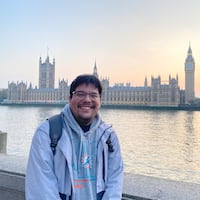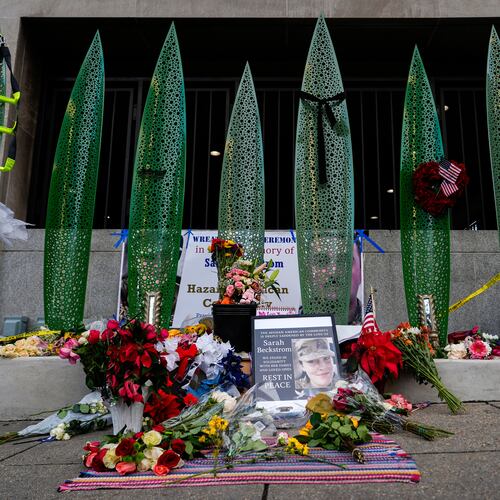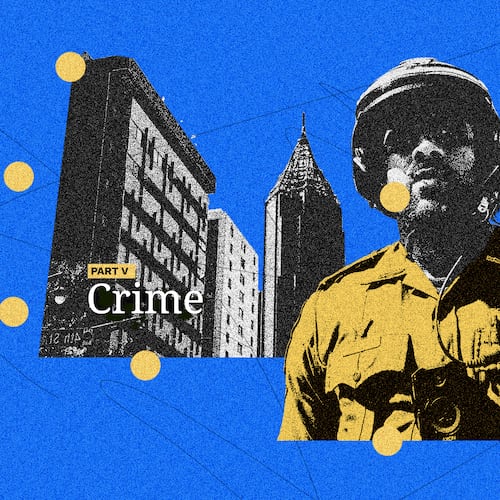Almost a decade before driving a truck into a New Year’s Day crowd in New Orleans, in a terrorist attack that killed at least 14 people and injured dozens of others, the man believed to be responsible talked to a student journalist at Georgia State University for a story about veterans’ transition to civilian life.
Shamsud-Din Jabbar was a GSU student at the time the 2015 story that quoted him ran in the university’s student newspaper.
“He had trouble acclimating to college life and, because he had come from the military, he wanted to help other people understand how to make the transition,” said Sean Keenan, the reporter who interviewed Jabbar for the story.
Jabbar, who was fatally shot by police in New Orleans, had spent more than a decade in the U.S. Army and Army Reserve, deploying to Afghanistan from February 2009 to January 2010, working in the regular Army as a human resource specialist and information technology specialist from March 2007 until January 2015.
Credit: FBI
Credit: FBI
Officials with Georgia State confirmed Jabbar earned a bachelor of business administration degree in computer information systems in 2017 and has not been an active student since. At the time of the 2015 GSU interview, Jabbar was an IT specialist in the Army Reserve and served as a transfer liaison with the Georgia State Student Government Association.
Keenan, a GSU student journalist at the time, now works as a freelance journalist based in Atlanta. He said, until yesterday, it was just “a pretty unremarkable interview” and described Jabbar as “a very calm guy, pretty reserved person, maybe a little bit distant.”
“He did not throw any red flags,” Keenan said.
In the interview, Jabbar talked about difficulties acclimating to civilian life, primarily due to some of the military terms he was used to speaking in.
“You may have a lot of skills and training from the Army,” he told Keenan in the story. “But you may not be able to speak the language to really translate it and be understood when you apply for a civilian job.”
Jabbar also talked about the process of getting GI Bill benefits, which helps veterans pay for college, and VA benefits and how sometimes it’s not as simple as it should be.
“The content of what we discussed was his challenges adapting to civilian life, and I’m not going to speculate that played a role in his supposed radicalization or anything like that, but I think the issues that he expressed having in my story reflects, a larger story about the difficulty that a lot of veterans have getting out of the service,” Keenan said.
Credit: Jozsef Papp
Credit: Jozsef Papp
Keenan was unaware of the connection between the terrorist attack in New Orleans and a story he wrote his first year in college, until an Atlanta Journal-Constitution reporter reached out asking for information. The story, which ran on The Signal in October 2015, actually has Jabbar’s name misspelled so Keenan wasn’t sure it was him until he began to see pictures of the suspect on different news outlets.
“I remembered his steely eyes, that was something that came back to me after this decade of pretty much forgetting about that interview was the guy had just a piercing stare,” Keenan said. “He looked a little different. He had more facial hair, he was grayer, his hairline wasn’t what it was in college, but I was like, ‘holy cow, that is the guy that I sat down with’.”
Keenan said it’s still a lot to process and feels surreal that a story he wrote in college would come back years later in connection to such a tragic national story. He doesn’t recall speaking to Jabbar again after that interview, other than possibly a follow-up call or email.
He wishes he had more information about Jabbar, other than an old story he wrote nearly a decade ago. Keenan said he’s not sure Jabbar’s time at GSU will help provide answers to the attack in New Orleans.
“We will probably spend weeks agonizing over why he may have done what he’s suspected of having done, which pieces of the puzzle are relevant,” Keenan said.
About the Author
Keep Reading
The Latest
Featured





